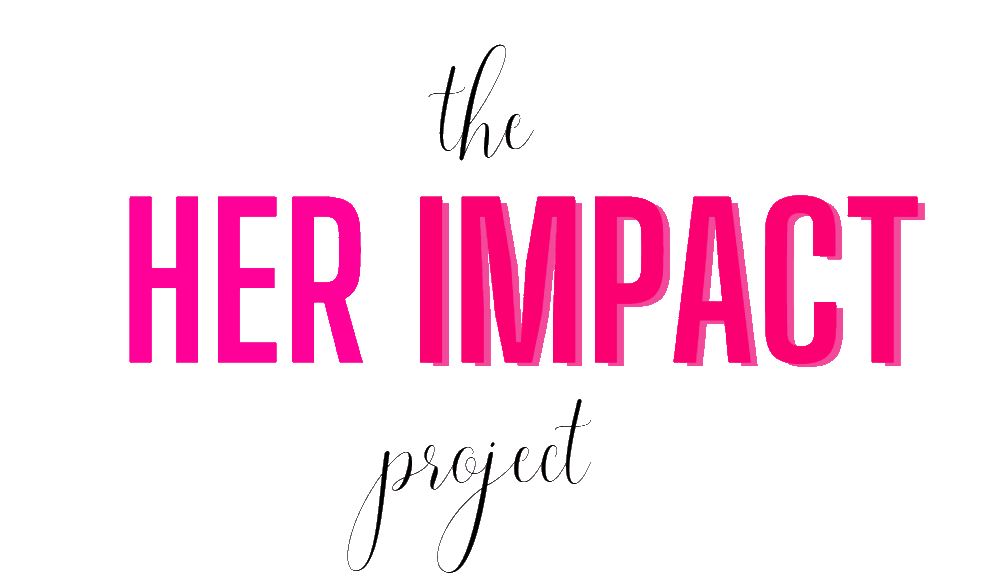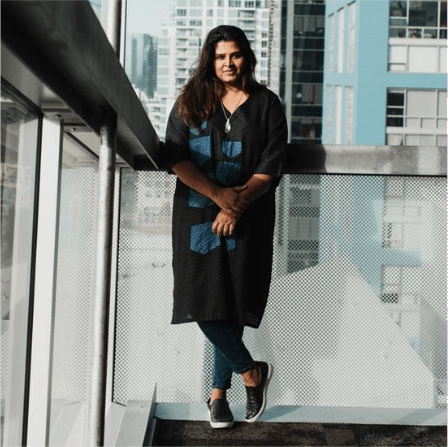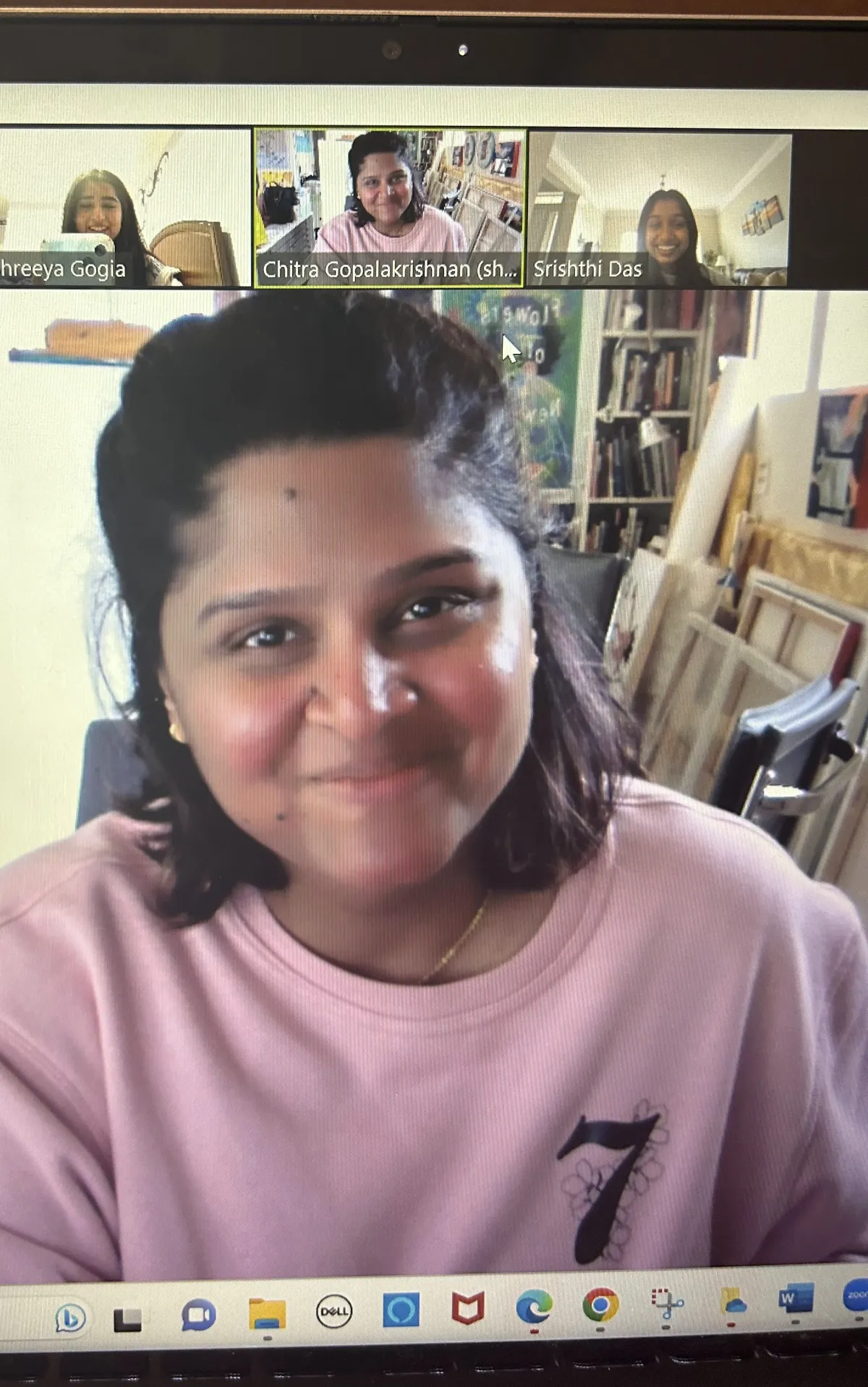
June 19, 2023
Meet Chitra Gopalakrishnan, the Co-founder of Kara Weaves

Hi Everyone,
Thank you for reading our fourth blog post. We are honored to have Chitra Gopalakrishnan, the Co-founder of Kara Weaves, featured on our blog!
Chitra is a graphic designer with a great affinity for new media and traditional art forms. She has an MFA in Graphic Design from the Cranbrook Academy of Art and the ESAG Penninghen, Paris. She is a graphic design faculty currently at San Diego State University and has my studio practice. She is also the Co-founder of a handloom revival project called Kara Weaves which she helped initiate with Indu Menon, a social anthropologist. She is in love with social marketing and its impact on rural art forms. Kara Weaves works with local weaving co-operatives across Kerala to produce and promote the craft of these artisans to a larger global audience through our online store. As a commercial designer, she has worked for Illum Design Project and often for Play Clan. In the past, she has also been a mentor of the Mobile Applications and Services Lab at Grand Valley State University, where she advised students working to design mobile applications.

Chitra came from a family of primarily engineers. Her parent’s jobs had her traveling around the world, and in high school, Chitra found herself in the Middle East. Due to the lack of college prospects in the Middle East, Chitra knew she had to travel for college. Even though she had primarily studied science, Chitra saw a magazine with graphic design and was curious as to what goes behind the design process of a magazine. She showed this magazine to her family and with their support, applied to an art school in France. At first, Chitra’s family was apprehensive about her pursuing a career in arts, however, over time they grew to support it as they knew she would do great things. While there, she started to love graphic design, particularly the intersection of art, communication, community, humor, pov, and storytelling. Although art school was competitive, including multiple cuts from the program. She then got her Masters in graphic design and moved to New Delhi to expand her skills as a designer. Here, she learned so many different parts of design and business. She had the opportunity to work in several different working environments which gave her the experience needed to develop her businesses.
Around this time, Chitra’s mother was retiring from her career in anthropology and noticed that the local weavers in her hometown of Kerela were facing struggles. All the industries in Kerala were on the uptake, however, the demand for the weave farm was decreasing. Chitra and Indu were from a family that prioritized generosity. Whether it was her grandparents building toilets for individuals in need, or helping women gain access to education, the Gopalakrishnan’s had always emphasized giving back. So, Chitra and Indu embarked on a new journey, brainstorming on how they could best help the weavers in their community.
Before we dive into Kara Weaves, it’s important to highlight the conditions the weavers were in and the struggles they faced in the weaving industry. The weavers lived in India, a historically patriarchal state. In addition, Kerala is one of the only communist states in India. This meant that the power goes back to the people, the local workers in unions are so strong that unfair labor conditions and practices are not tolerated. Even so, the weavers were still struggling in their situations. The weavers had developed a complex network but their lack of connection to the major market is what stopped them from expanding their business. This is where Chitra came in and developed Kara Weaves with Indu. She started factoring in the skills she had learned in her education in graphic design and helped the weavers expand their business. Additionally, India’s system works in a way that elders are normally highly respected for their wisdom and experience. Due to this culture, Indu was highly respected as a co-founder of Kara Weaves and Chitra quickly learned that they each had a role in the company that they had to take care of.
Using the values and practices of their culture, Chitra and Indu brainstormed the name Kara Weaves for their business. Kara is a traditional name from Kerala that means border, which represents the stripes traditionally on clothes in their community, and so Kara Weaves was born.
Using the same values of excellence and loyalty instilled in her by her parents, Chitra wanted the company to be simple and solely focus on helping the weavers. This entailed having a small number of employees and a tight-knit circle to ensure that everything at Kara Weaves would run smoothly. In this process of hiring employees, Chitra and Indu noticed a certain pattern. Whenever male employees were hired and put under female instruction, they did not listen well and often did whatever they thought was right instead of following directions. Chitra realized that the main way they could maximize their working and production capabilities was by making Kara Weaves a predominantly female-run company. Chitra expressed how the women she employed tend to be highly organized as they control a lot of the household work and responsibility in their lives along with taking care of their families and children. Due to this busy schedule, they wanted to ensure that they allowed the weavers to work rurally if they needed to, bring kids to work, get extended time off, and accommodate any external factors that they were dealing with.
In addition, Chitra and her mother wanted to make sure every product was fair trade. This included accommodating the women’s different working styles. Chitra and Indu wanted to preserve the traditional weaving and designs that the weavers were used to rather than develop new methods. They worked with “cooperatives”, which were the independent groups of weavers, to ensure sustainable practices. This effort to work with the cooperatives was to ensure recognition for their work, while also making sure each woman had a sustainable income. Although the cooperatives received orders from the government, the government doesn’t place consistent orders which means the women don’t have a stable income, there are payment delays, and sometimes they pay for goods, which also doesn’t help provide the women with stability. Kara Weaves tries to do the opposite- ensuring stability for these women. Rather than asking current weavers to make new designs, Kara Weaves asks them to make what they are best at while diversifying the cooperatives when they need new designs. This stability is key for the weavers, as it allows children to learn and pass down the knowledge of weaving, as it is seen as a viable livelihood, protecting the culture.
During this process, Chitra learned the importance of preserving traditional weaving processes. These weaving processes had a deep connection to the land and the environment, and they did not require new technology, and there was no electricity, nor much water. These clothes also took up a small amount of space and were multipurpose, which could help keep their clothes from going into landfills. In addition, their clothes were simple rectangles, which reduced cutting waste. The fabrics were sustainable, with different forms of minimal indigenous designs. After working on a product that could preserve the culture and practices of these weavers, Chitra set out on testing these products- which included seeing the wear and tear in her dorm and college.
Chitra’s advice for young women starting a business is to crystallize your idea first instead of trying to do everything at once and have a complicated business model. If she could go back in time, she would start small instead of trying to have a complex catalog. Additionally, she suggests testing your products multiple times first before expanding your merchandise. Chitra highly values social marketing and suggests posting things online and being transparent about where your products come from to create a more niche brand and attract likeminded individuals interested in supporting your cause.
Long-term wise, Chitra wants Kara Weaves to become a replicable model, she wants to expand her existing resources, like the online store she has, and use the business to continue to empower women in the workplace. She wants to continue to collaborate with other groups and craft communities that care about protecting workers and enhancing their unique abilities.
You can support Chitra and Indu by posting about Kara Weaves, buying their amazing products, and spreading their message to people who like to buy sustainably and are interested in hand-woven products. We urge you to check Chitra and Indu’s workout on karaweaves.com and encourage your family and friends to buy their sustainably made handwoven goods.
Thank you for reading our post!
Site made by Ashwin Iyer